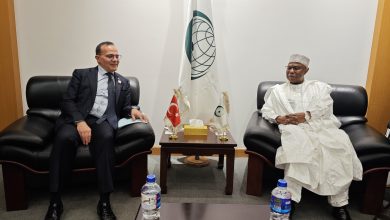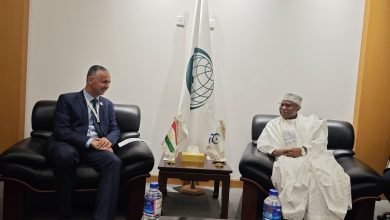
Jeddah (UNA) - The extraordinary meeting of the Executive Committee of the Organization of Islamic Cooperation (OIC) urged the Afghan caretaker government to reverse its decision to deny Afghan girls the right to education.
The meeting, which was held on Wednesday at the headquarters of the OIC General Secretariat in Jeddah, comes to discuss the latest developments and the humanitarian situation in Afghanistan in response to a joint invitation from the Kingdom of Saudi Arabia, the current Chairman of the Islamic Summit and Chairman of the Executive Committee, and the Republic of Turkey and the Republic of the Gambia.
In its closing statement, the Executive Committee affirmed that education is one of the basic human rights that all individuals must enjoy, based on the principle of equal opportunity in a non-discriminatory manner and not depriving them of this right.
She expressed her disappointment at the suspension of education for women and girls in Afghanistan, and at the decision requiring all national and international non-governmental bodies to suspend women's work until further notice.
She urged the Afghan de facto authorities to abide by the principles and purposes contained in the Charter of the United Nations and the Charter of the Organization of Islamic Cooperation, and to respect their obligations under international treaties and agreements, including their obligations under international human rights covenants, particularly with regard to the rights of women, children, youth, the elderly and people with special needs.
She called on the Afghan de facto authorities to work to reopen schools and universities for girls and enable them to enroll in all stages of education and all specializations needed by the Afghan people, stressing the need to protect basic rights, including the right to life, security, dignity and the right to education, for all Afghan women and girls. , in accordance with Islamic values and international standards of human rights.
The Executive Committee warned against the interruption of the provision of field humanitarian aid and that international humanitarian aid, educational and health services and other social services for the Afghan people should not be hindered due to the lack of female employees.
At the outset of the committee meeting, the permanent Saudi representative to the organization, Dr. Saleh Al-Suhaibani, during his delivery of the Kingdom of Saudi Arabia’s speech, expressed the Kingdom’s surprise and deep regret at the decision of the Afghan caretaker government to deny Afghan girls the right to education, stressing that the Kingdom calls in the same regard to reverse this decision, which It is surprising in all Islamic countries, as this contradicts giving Afghan women their legal rights.
Al-Suhaibani stressed that depriving Afghan women of their legal rights may lead to the continuation of mass migrations of educated Afghan men and women, which may lead to an exacerbation of humanitarian crises, reiterating the Kingdom's request to the Afghan caretaker government to enable Afghan women to have the right to education, which in turn contributes to supporting security, stability, development and prosperity. For Afghanistan and its brotherly people; The legal texts that urge and encourage learning are directed towards women and men alike.
In the speech, he referred to the fairness of our true Islamic religion and its honoring of women, so that under it she enjoyed her full rights, and made her education a firm right for her, and even one of the civilized duties and necessities that should not be abandoned or deprived of it.
The speech carried a reaffirmation that the Kingdom of Saudi Arabia, under the generous directives of the Custodian of the Two Holy Mosques King Salman bin Abdulaziz Al Saud, and his Crown Prince, continues its commitment to support the relentless efforts of the Organization of Islamic Cooperation towards Afghanistan, as the Kingdom has initiated the implementation of many relevant decisions issued by The Ministerial Council of Foreign Ministers of Islamic Countries issued by the extraordinary meeting of the Council on discussing the humanitarian situation in Afghanistan, which was held at the invitation of the Kingdom and hosted by the Islamic Republic of Pakistan in December of the year XNUMX AD.
Al-Suhaibani revealed, through his speech, the most important decisions regarding the situation in Afghanistan, including the decision to support the Trust Fund for Afghanistan, which operates under the umbrella of the Islamic Development Bank and in coordination and cooperation with the Organization of Islamic Cooperation, as the Kingdom made a generous donation to the Fund of more than XNUMX million Saudi riyals, in addition to what it provided Support for the mission of the Special Envoy for Afghanistan, and for the organization's office in Kabul through the General Secretariat; In order to achieve the decisions of the Ministerial Council at its forty-eighth session, which was held in Pakistan last March.
He also made it clear that the Kingdom had earlier implemented many relief projects in Afghanistan through the King Salman Center for Relief and Humanitarian Action, with an amount of more than $XNUMX million, and had run an air and land bridge to Afghanistan, in addition to the generous support and donations provided. precedent over the past decades.
Al-Suhaibani added that all of this comes as a continuation of the Kingdom's humanitarian and relief efforts, and as a continuation of the Kingdom's march of solidarity towards the Islamic peoples, whose compass is difficult to determine. Because it utters good and support in all directions, in order to alleviate the suffering of the brotherly Afghan people, and to reduce the risks of deterioration of the critical humanitarian situation in Afghanistan, which may affect regional and international peace and stability.
Al-Suhaibani expressed the Kingdom's aspirations for the integration of efforts in this regard and its encouragement for all initiatives offered by member states and regional and international organizations that are able to join in contributing to this humanitarian trust fund for Afghanistan, and to provide more support and assistance to the brotherly Afghan people, especially in light of the difficult humanitarian conditions they are going through. At the same time, appreciating the generous support provided by a number of member states to this trust fund, which confirms our agreement that providing relief support and speedy humanitarian response to the Afghan people is something that requires standing with them; To avoid any serious humanitarian disasters that bring suffering and pain to this brotherly people.
For his part, the Secretary-General of the Organization of Islamic Cooperation, Hussein Ibrahim Taha, confirmed that the General Secretariat is seeking, in coordination with the International Islamic Fiqh Academy, to dispatch a second team of scholars to Afghanistan to continue the dialogue with the de facto authority on depriving Afghan girls and women of their basic rights to education, employment and social justice. Which constitutes a great priority for the Islamic world.
In his speech, the Secretary-General stressed that the organization has been following with deep concern the developments of the unfortunate events in Afghanistan, noting that “we conveyed, through my special envoy, messages to the de facto authority in which we emphasized the importance of the government fulfilling its previous promises to open schools for girls in light of the solid and clear foundations in the Islamic religion.” Al-Hanif, who urges this, and that resolving this issue will open the door wide for more constructive cooperation between the government and member states and openness to the world.
With regard to the decision of the de facto authority in Afghanistan to suspend the work of female employees in national and international non-governmental organizations, the Secretary-General stressed that this would affect the humanitarian and relief operations carried out by a wide network of non-governmental organizations and harm the interests of the Afghan people. In this context, Mr. Hussein Taha renewed his call to the de-facto authority to reconsider this decision for the sake of the social inclusion of women and the uninterrupted continuity of the tasks of the International Network for Human Security in Afghanistan.
The Secretary-General appreciated the statements issued by Member States, the International Islamic Fiqh Academy, the Women’s Development Organization, the Permanent Commission for Human Rights, Al-Azhar Al-Sharif, the Council of Senior Scholars in the Kingdom of Saudi Arabia, and the Muslim World League, which emphasized the position of Islamic law on the need for women’s education, work, and participation in public life.
The Secretary-General affirmed that the organization will remain committed, through the efforts of the Special Envoy, to the positive dialogue with the de facto authority in Afghanistan, within the framework of the mandate granted to him by the Council of Foreign Ministers, to focus on issues of girls' education, women's participation in public life, combating terrorism and inclusive government in Afghanistan.
(is over)





